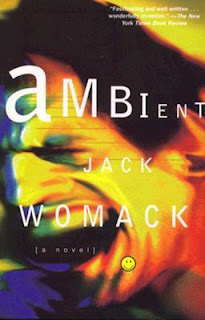(July 2016)
The first of Womack’s Dryco series, or at
least the first one he wrote. Ambient
is the book to which Random Acts of Senseless Violence serves as a prequel, and while that story described
polite society’s shockingly rapid descent into dystopia, the one we’re talking about
here gives us the shit show already in full effect.
Ruben shook his head, tossing his cigarette to his mouth with a
quick flip of his chin. “To sight your ragged puss in glory grand,” he laughed,
“to taunt your mind with apish tricks.”
I don’t know for sure, but I dearly hope
these particular lines are a riff on God Save the Queen.
Ambient is set a little further into the future then Random Acts. We’re still “within our lifetimes”, but things have
advanced enough to move the genre beyond simple dystopia. We could file this
under cyberpunk; it’s certainly got that juxtaposition of extremes thing going
on, in addition to the requisite future tech and belated appearance of an all-powerful
AI. The plot—oligarch’s bodyguard and mistress plot to assassinate their master
and then deal with the fallout of their hastily improvised plans—is essentially
an excuse to take us on a walking tour of a New York all fucked three times
sideways. The necessary tropes are all here: untouchable elites enjoying
ring-fenced opulence, unwashed masses toiling in poverty, quasi-spiritual
underground movements, corrupt military-industrial establishment, high-tech
body mods, hookers, pushers, madness, and despair. It’s a huge amount of fun.
I mean that honestly. A while back, while
reviewing the frankly weak Haw for Strange Horizons, I saw fit to name drop
Jack Womack as a nod to how dystopian urban decay should be done (which, to be
honest, was just a happy byproduct of wanting to both reference a genuinely
effective queer-teen-led dystopia, and to make a cheap gag on the title of Random Acts). It’s therefore very
reassuring to have that assessment borne out here, because if what marked Haw (and, for me, irreparably damaged
it) was its unrelenting, po-faced earnestness, one of the defining features of Ambient is its humour. It’s a humour as
dark as lung cancer, for sure, and so probably not to everyone’s taste, but it’s
definitely there and, more importantly, it serves the vital purpose of defining
the artifice of the book.
What I mean by this is that, while Haw often came across as a hectoring
lecture about how shitty the world is,
Ambient presents itself as a satire
on the way the world could be. It’s
the difference between a skillfully grotesque caricature and one of those appalling political cartoons at which the Americans seem to specalise, wherein every
object and person is given an explicit label lest the reader miss the
sledgehammer subtle point; the former is obviously aware of the absurdity of
its exaggerations and its reasons for deploying them, while the latter is
aiming for a sort of allegorical mimesis, or at least an honesty on its own
terms, and missing woefully. It’s also bleakly hilarious, if the concepts of
Elvis as Jesus and orphan duck hunts float your boat.
Britain was in good form; under the guidance of King Charles—presently
occupying himself buying horses in Kentucky—and the National Front,
unemployment was down to 80 percent.
See? Both absurd—if only because what
self-respecting authoritarian government would let those sorts of figures out
without cooking them more thoroughly first?—and also just prescient enough to
cause some nervous twitches of recognition.
As it was Womack’s debut novel, it’s
inevitably a little ragged around the edges. The plot is pretty cursory, even
if that isn’t really the point; sundry other characterization issues could have
stood some tightening up; and for all the beauty of the street dialect it’s not
as consistently well-executed as it could (and later is) have been. But this is
all countered by the grim joy and sheer verve with which he sets up and demolishes
his world and the people in it. The dead tree versions of the Dryco series in
its entirety appear to be out of print, but they are all available through the
Gollancz SF Gateway. While I’m still not a whole-hearted convert to digital
publishing, the potential for accessing otherwise unobtainable backlist books
such as these is a key argument in its favour. Recommended.

No comments:
Post a Comment